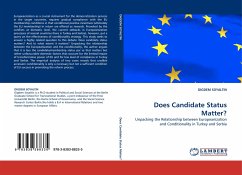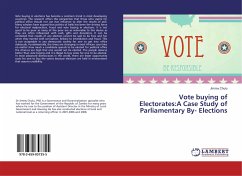
Does Candidate Status Matter?
Unpacking the Relationship between Europeanization and Conditionality in Turkey and Serbia
Versandkostenfrei!
Versandfertig in 6-10 Tagen
32,99 €
inkl. MwSt.

PAYBACK Punkte
16 °P sammeln!
Europeanization as a crucial instrument for the democratization process in the target countries, requires gradual compliance with the EU membership conditions in that conditional positive incentives (ultimately the EU membership) in return are offered as rewards. Provoked by the conflicts at domestic level, the current setbacks in Europeanization processes of several countries (here is Turkey and Serbia), however, put a query on the effectiveness of conditionality strategy. This study seeks to answer a highly related question to this debate: Does candidate status matters? And to what extent it...
Europeanization as a crucial instrument for the democratization process in the target countries, requires gradual compliance with the EU membership conditions in that conditional positive incentives (ultimately the EU membership) in return are offered as rewards. Provoked by the conflicts at domestic level, the current setbacks in Europeanization processes of several countries (here is Turkey and Serbia), however, put a query on the effectiveness of conditionality strategy. This study seeks to answer a highly related question to this debate: Does candidate status matters? And to what extent it matters? Unpacking the relationship between the Europeanization and the conditionality, the author argues that it is less the candidate/membership status per se that matters but rather unfavourable domestic factors that account for the limited impact of transformative power of EU and for low level of compliance in Turkey and Serbia. The empirical analysis of two cases reveals that credible accession conditionality is only a necessary but not a sufficient condition of EU success in promoting the reform process.












